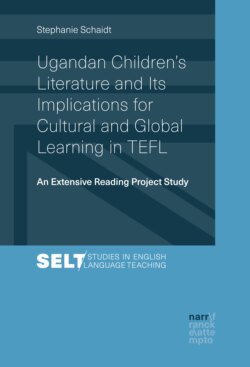Читать книгу Ugandan Children's Literature and Its Implications for Cultural and Global Learning in TEFL - Stephanie Schaidt - Страница 37
На сайте Литреса книга снята с продажи.
5.2 Research Aim
ОглавлениеThe intention of this research project is to look into mental processes of Year 9 students in Germany who read Ugandan children’s fiction within the scope of an extensive reading project. It is analysed how students tackle this literature, what significance different contextual factors have on their reading process, and also the potential and limitations of extensive reading projects for cultural and global learning. Both the students’ expectations before the project and their experiences and reflections during and after the reading process are taken into account. For this purpose, I draw on constructivist learning theories (see also Chapter 2.6).
According to constructivist learning theories, learners actively construct their own subjective representations of reality; new information is linked to prior knowledge: “What we already know will interact with new perceptions and explain these perceptions” (Müller, 2000, p. 45). Taking this into consideration, it is important to get an insight into students’ prior knowledge in this study. Since the concept of knowledge is very complex, a full account of students’ prior knowledge cannot be given. The present study intends to provide a glimpse into students’ associations and expectations regarding Uganda and Ugandan children’s fiction before reading the narratives.
A second context which can be seen to have an impact on the students’ mental processes in an extensive reading project is their reading background, i.e. their reading competence1 and reading motivation2. Language difficulties which inhibit the students’ understanding, for example, need to be considered. Furthermore, the general attitudes that the students have towards reading literary texts and their emotions towards the texts they read in the project have to be looked into. These emotions may refer to different aspects of the narratives, i.e. the language or writing style, the plot, the characters or the moral/lesson/theme.
Another context which requires inclusion in this study is the students’ biographical background. According to social constructivism (Berger & Luckmann, 1966; Rogoff, 1990), learners cognitively develop in the context of education and socialisation. Personal experiences may influence the way a student reads a text and, in reverse, a text may initiate reflections upon self. Therefore, information concerning the biographical background of the students needs also to be taken into account.
Concerning the mental processes of the students, I am particularly interested in the following questions:
To what extent do the students construct/deconstruct knowledge and attitudes?
To what extent do they draw comparisons and which similarities and differences do they construct?
What in the texts is ‘foreign’ to them, what do they mark as ‘other’?
Which strategies do they unconsciously or consciously make use of in the reading and understanding process?
To what extent and how do they reflect?
To what extent do their reflections focus on ‘self’; e.g. their own prior knowledge/norms/stereotypes?
Particular emphasis in this study is put on students’ mental processes with reference to so called ‘global topics’, i.e. HIV/AIDS, child soldiers and gender issues (see Chapter 7.3).
